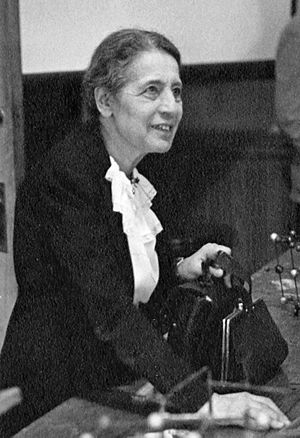Meitnerium facts for kids

Meitnerium is a special chemical element that you won't find naturally on Earth. Scientists have to make it in a laboratory. It's known as a "superheavy" element because it has a very high atomic number, which is 109. This number tells us how many protons are in the center of its atom.
Meitnerium is a synthetic element, meaning it doesn't exist in nature. It was first created in 1982. Its official symbol is Mt. Scientists believe it would be a solid at room temperature, possibly looking white, gray, or silver.
Contents
What is Meitnerium?
Meitnerium is a very rare and unstable element. It belongs to a group called transition metals on the periodic table.
How is Meitnerium Made?
Scientists create meitnerium by smashing smaller atoms together. This process happens in special labs using powerful machines called particle accelerators. It's a bit like building a very tiny, complex LEGO structure by throwing pieces at each other at super high speeds!
Why is it so Hard to Make?
Making meitnerium is difficult because the atoms need to hit each other with just the right amount of energy. If they hit too hard or too soft, they won't stick together to form the new, heavier element.
What is Half-Life?
Meitnerium is very unstable. This means it breaks apart very quickly. Scientists use a term called "half-life" to describe how long an unstable element lasts. The half-life of meitnerium is very short, only about one second. This means that after just one second, half of any meitnerium made will have already changed into other, lighter elements.
Who is Lise Meitner?
Meitnerium is named after a brilliant scientist named Lise Meitner (1878-1968). She was a physicist from Germany.
Her Important Discovery
Lise Meitner was a key figure in understanding nuclear fission. This is the process where the nucleus of an atom splits into two or more smaller nuclei. This discovery was very important for understanding how atoms work and for developing new technologies.
Why was Meitnerium Named After Her?
Scientists decided to name element 109 after Lise Meitner to honor her huge contributions to physics and her work with radioactivity. It's a way to remember her important role in science history.
Uses of Meitnerium
Because meitnerium is so unstable and only lasts for about a second, it has no practical uses outside of scientific research. Scientists study it to learn more about the properties of superheavy elements and how atoms are put together.
Studying Superheavy Elements
By creating and studying elements like meitnerium, scientists can test their theories about the atomic nucleus. This helps them understand the fundamental forces that hold matter together.
| Group | 1 | 2 | 3 | 4 | 5 | 6 | 7 | 8 | 9 | 10 | 11 | 12 | 13 | 14 | 15 | 16 | 17 | 18 | |
|---|---|---|---|---|---|---|---|---|---|---|---|---|---|---|---|---|---|---|---|
| Hydrogen & alkali metals |
Alkaline earth metals | Triels | Tetrels | Pnictogens | Chalcogens | Halogens | Noble gases |
||||||||||||
| Period |
|||||||||||||||||||
| 2 | |||||||||||||||||||
| 3 | |||||||||||||||||||
| 4 | |||||||||||||||||||
| 5 | |||||||||||||||||||
| 6 | |||||||||||||||||||
| 7 | |||||||||||||||||||
Primordial From decay Synthetic Border shows natural occurrence of the element
- Ca: 40.078 — Abridged value (uncertainty omitted here)
- Po: [209] — mass number of the most stable isotope
See also
 In Spanish: Meitnerio para niños
In Spanish: Meitnerio para niños
 | John T. Biggers |
 | Thomas Blackshear |
 | Mark Bradford |
 | Beverly Buchanan |

